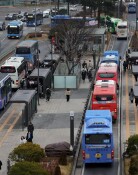Over 50% of seriously underpaid workers are seniors, study shows
Over 50% of seriously underpaid workers are seniors, study shows
Posted May. 10, 2023 07:50,
Updated May. 10, 2023 07:50


Kim Jeong-soo (assumed name, age 68) was a former office worker in Korea who retired four years ago from a multinational company. Despite graduating from a prominent university in the country and once being a high-flyer, his life after retirement has been far from enjoyable, just like many in his age. Instead of being able to pursue hobbies like golfing and live a comfortable life, Kim struggles to make ends meet. His monthly old-age pension payout is less than two million Korean won, which barely covers the basic living expenses for him and his spouse.
After relying on his retirement payment for some time, Kim recently began actively searching for a job. However, the only job offers he received were non-regular part-time positions, such as delivering credit cards or providing valet parking services at restaurants. Despite his willingness to take on the card delivery job that pays a meager 1,500 won per case (approximately 400,000 to 500,000 won per month), he noticed that employers seemed to prefer hiring young people even for such positions.
Despite their skill sets and experience, more and more elderly workers like Kim are being forced into underpaid, menial jobs against their wishes. On Tuesday, The Dong-A Ilbo analyzed data on workers who received less than the minimum wage between 2017 and 2022, compiled by the Minimum Wage Commission and the Korea Enterprises Federation. The results showed that 45.5% of the 2.756 million workers who received less than the minimum wage (9,160 won per hour) in 2022 were aged 60 or older - which means that one in two disproportionately underpaid workers are seniors. This ratio, which stood at 35.6% in 2017 and slightly decreased to 32.5% in 2018, has been steadily increasing. With around 30% of the over-60 population being economically active, the number of elderly workers struggling with underpayment and deteriorating job quality is rapidly rising.
While it's not uncommon to see elderly people in low-paying jobs due to their lower labor productivity compared to younger generations, experts note that the speed at which this ratio is growing is alarming. The competition for jobs among older workers is also becoming increasingly intense, leaving many struggling to find decent employment. According to Park Ji-soon, a professor at Korea University School of Law, this trend is likely to continue as good-quality jobs for seniors become scarcer and younger workers increasingly dominate the market for decent jobs. As a result, he added, more and more seniors will be forced to settle for low-paying, menial, and part-time jobs.
Mee-Jee Lee image@donga.com · Hye-Ryung Choi herstory@donga.com







